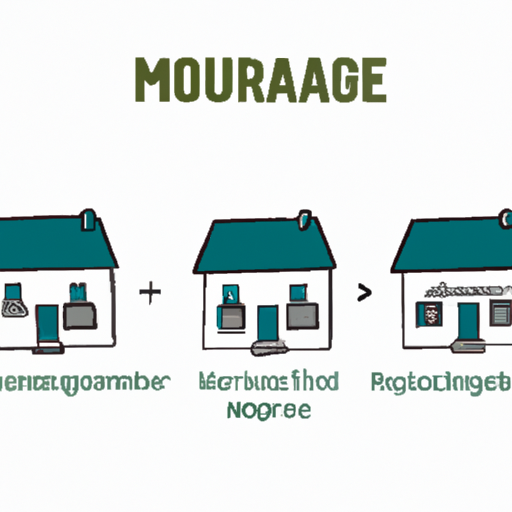Navigating the world of mortgages can be overwhelming for first-time homebuyers. This blog post aims to provide essential tips for securing a mortgage, empowering readers to make informed decisions and ultimately achieve their dream of homeownership.
1. 'Do your homework': Understanding different mortgage types
When it comes to getting a mortgage, the first step is to understand the different types of mortgages available. A mortgage is essentially a loan that is used to purchase a property. There are several different types of mortgages, each with its own set of terms and conditions. Before you start applying for a mortgage, it's important to do your homework and understand the different types of mortgages available, so you can choose the one that best suits your needs.
The most common type of mortgage is a fixed-rate mortgage. This type of mortgage has a fixed interest rate that remains the same for the entire term of the loan. This means that your monthly mortgage payment will remain the same, making it easier to budget and plan for your expenses. Fixed-rate mortgages are popular among homeowners who want the stability and predictability of a fixed payment.
Another type of mortgage is an adjustable-rate mortgage (ARM). With an ARM, the interest rate is variable, meaning it can fluctuate over time. This type of mortgage can be riskier, as your monthly payment could increase if interest rates rise. However, an ARM may be a good option for homeowners who plan to sell their home within a few years, as the initial interest rate is often lower than a fixed-rate mortgage.
There are also government-backed mortgages, such as FHA loans and VA loans. FHA loans are insured by the Federal Housing Administration and are designed for first-time homebuyers or those with lower credit scores. VA loans are guaranteed by the Department of Veterans Affairs and are available to eligible veterans and their spouses. These types of mortgages often have lower down payment requirements and more flexible credit score requirements.

An illustration of various mortgage types, such as fixed-rate, adjustable-rate, and FHA loans
2. 'How much house can you afford?': Determining your budget
Before you start looking for a home, it's important to determine how much house you can afford. This involves taking a close look at your income, expenses, and debts to determine what you can comfortably afford to pay each month. Your monthly mortgage payment should ideally be no more than 28% of your gross monthly income. It's also important to consider other expenses, such as property taxes, homeowners insurance, and maintenance costs.
One way to determine how much house you can afford is to use an online mortgage calculator. This can give you an idea of what your monthly payments might look like based on different interest rates, loan terms, and down payment amounts.
It's also important to consider your credit score when determining your budget. A higher credit score can lead to lower interest rates, which can save you thousands of dollars over the life of the loan. If your credit score is lower, you may need to work on improving it before applying for a mortgage.
When determining your budget, it's important to be realistic and not overextend yourself. Remember that unexpected expenses can arise, and you don't want to be in a situation where you can't afford your monthly mortgage payments. It's better to buy a more modest home that you can comfortably afford than to stretch yourself too thin and risk losing your home.
3. 'The early bird gets the worm': Preparing your finances well in advance
Preparing your finances well in advance can help you secure a mortgage with favorable terms and interest rates. Here are some steps you can take to get your finances in shape before applying for a mortgage.
- 1. Check your credit report:
Your credit report plays a big role in determining your credit score, which is a key factor in getting approved for a mortgage. Check your credit report for errors or inaccuracies and take steps to correct them if necessary. - 2. Pay down debt:
A high level of debt can hurt your chances of getting approved for a mortgage, so it's important to pay down as much debt as possible before applying. This can also improve your debt-to-income ratio, which is another important factor that lenders consider. - 3. Save for a down payment:
Saving for a down payment can help you qualify for a mortgage with better terms and lower interest rates. Aim to save at least 20% of the purchase price of the home, as this can help you avoid paying private mortgage insurance (PMI).In addition to these steps, it is important to start gathering the necessary documentation well in advance of applying for a mortgage. This can include tax returns, bank statements, and pay stubs. Having these documents ready to go can help streamline the application process and make it easier for you to provide the information that lenders need.

A checklist with key financial preparation steps, such as improving credit scores and saving for a down payment
4. 'Don't go it alone': Working with a mortgage broker
Navigating the mortgage process can be overwhelming, which is why it's important to consider working with a mortgage broker. A mortgage broker is a licensed professional who can help you find and compare mortgage options from multiple lenders, ultimately helping you find the best deal for your needs.
One of the key benefits of working with a mortgage broker is their ability to shop around on your behalf. Instead of having to contact multiple lenders and compare their offers yourself, a mortgage broker can do the legwork for you, presenting you with a range of options to choose from.
In addition to saving you time and effort, a mortgage broker can also help you navigate the complexities of the mortgage process. They can explain the different types of mortgages and their respective pros and cons, as well as help you understand the various fees and costs involved in getting a mortgage.
Another benefit of working with a mortgage broker is their ability to negotiate with lenders on your behalf. Because they have established relationships with multiple lenders, they may be able to secure better terms or interest rates than you would be able to get on your own.
In conclusion, obtaining a mortgage is a significant step in the home buying process. By following these tips, prospective homeowners can better understand their options, strengthen their financial position, and pave the way for a successful mortgage application.

